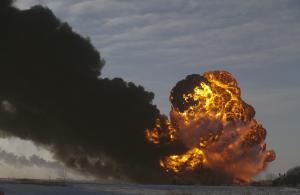By Brendan O'Brien
(Reuters) -
Eighteen of 20 tanker cars carrying oil that derailed in the fiery crash
of two trains in North Dakota in late December were punctured, spilling
more than 400,000 gallons of crude oil, safety regulators reported on
Monday.
In a preliminary
report, the National Transportation Safety Board said the oil train
heading east struck a derailed car from a westbound grain train, leading
to the derailment and fire about a mile outside the small town of
Casselton, North Dakota, on December 30.
Both trains were operated by BNSF Railway Co, more than 100 cars long
each and were traveling well below the posted 65-mile-per-hour speed
limit, the NTSB report said. BNSF is owned by Warren Buffett's Berkshire
Hathaway Inc.
The grain
train was traveling at 28 mph (45 km per hour) and the oil train at 43
mph when emergency braking systems were applied on both trains, the
report said.
A series of
powerful explosions and fireballs followed the collision, with the blaze
creating plumes of thick, black smoke that passed over Casselton,
forcing about 1,400 people in the area from their homes. No injuries
were reported.
The incident caused about
$6.1 million in damage, according to the NTSB report. A broken axle and
two wheels were shipped to the NTSB laboratory in Washington for further
evaluation, as were locomotive event and video recorders, the agency
said.
"Thankfully, no one was
hurt, but this accident underscores the need to work to prevent
derailments in the first place, and to upgrade the tanker fleet to
reduce the risk of fires and explosions if an accident does occur," U.S.
Senator John Hoeven, a North Dakota Republican, said in a statement.
Hoeven said he reviewed the preliminary report and called on the
Pipeline and Hazardous Materials Safety Administration to issue new
standards for tanker car construction.
The crash came five months after a runaway oil train carrying Bakken
crude derailed and exploded in the center of the Quebec town of Lac
Megantic, killing 47 people.
The incident fueled a drive for tougher standards for such shipments,
including potentially costly retrofits to improve the safety of tank
cars that regulators have cited as prone to puncture.
In early November, two dozen cars on another 90-car oil train derailed
in rural Alabama, erupting into flames that took several days to
extinguish.
The Association of American Railroads recently
proposed costly fixes to older tank cars that do not meet its latest
standards, but continue to carry hazardous fuels such as oil.
The fixes include protective steel jackets, thermal protection and
pressure relief valves, which could cost billions of dollars. Oil
shippers, likely to be saddled with the costs of retrofits, oppose some
of the changes proposed by the association.
(Editing by David Bailey, Jonathan Oatis and Andre Grenon)


No comments:
Post a Comment
Note: Only a member of this blog may post a comment.